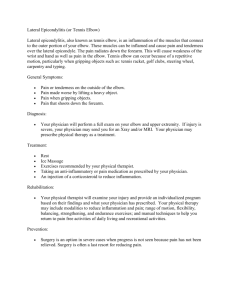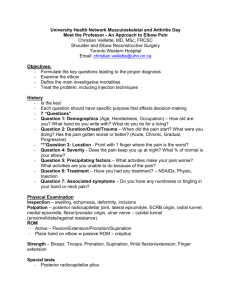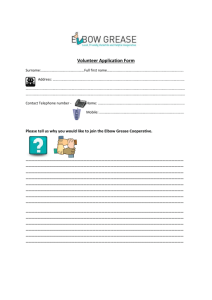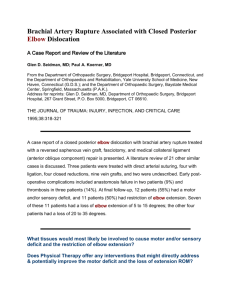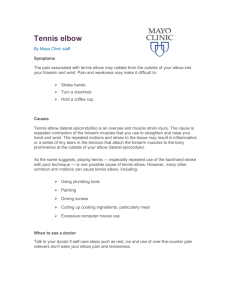Desperation Writing
advertisement
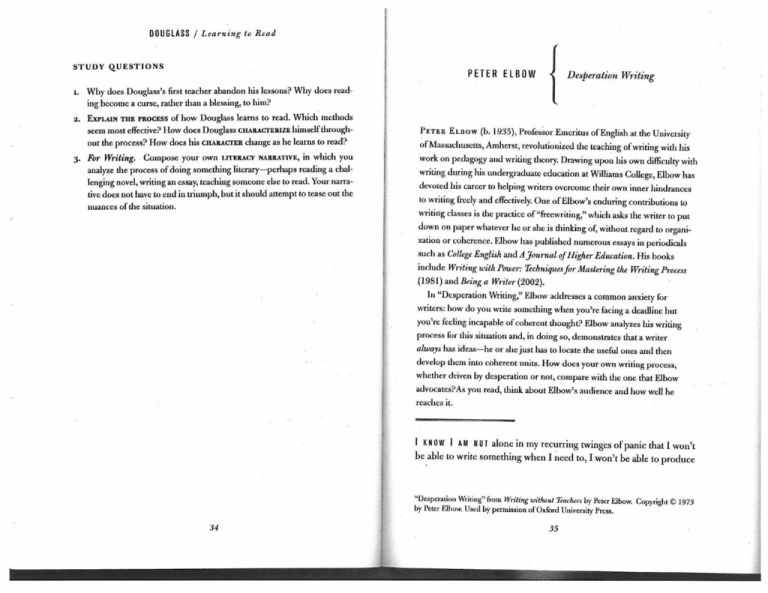
DOUGLASS /Learning to Read STUDY QUESTIONS PETER ELBOW 1. Why does Douglass's first teacher abandon his lessons? Why does reading become a curse, rather than a blessing, to him? 2. ExPLAIN THE PROCESS of how Douglass learns to read. Which methods seem most effective? How does Douglass CHARACTERIZE himself throughout the process? How does his CHARACTER change as he learns to read? Desperation Writing PETER ELBOW (b. 1935), Professor Emeritus of English at the University of Massachusetts, Amherst, revolutionized the teaching of writing with his 3. For Writing. Compose your own LITERACY NARRATIVE, in which you analyze the process of doing something literary-perhaps reading a challenging novel, writing an essay, teaching someone else to read. Your narrative does not have to end in triumph, but it should attempt to tease out the nuances of the situation. work on pedagogy and writing theory. Drawing upon his own difficulty with writing during his undergraduate education at Williams College, Elbow has devoted his career to helping writers overcome their own inner hindrances to writing freely and effectively. One of Elbow's enduring contributions to writing classes is the practice of"freewriting," which asks the writer to put down on paper whatever he or she is thinking of, without regard to organization or coherence. Elbow has published numerous essays in periodicals such as College English and A Journal ofHigher Education. His books include Writing with Power: Techniques for Mastering the Writing Process (1981) and Being a W1-iter (2002). In "Desperation Writing," Elbow addresses a common anxiety for writers: how do you write something when you're facing a deadline but you're feeling incapable of coherent thought? Elbow analyzes his writing process for this situation and, in doing so, demonstrates that a writer always has ideas-he or she just has to locate the useful ones and then develop them into coherent units. How does your own writing process, whether driven by desperation or not, compare with the one that Elbow advocates?As you read, think about Elbow's audience and how well he reaches it. I KN 0 W I AM N0 T alone in my recurring twinges of panic that I won't be able to write something when I ~eed to, I won't be able to produce "Desperation Writing" from Writing without Teachers by Peter Elbow. Copyright © 1973 by Peter Elhow. Used by permission of Oxford University Press. 34 35 ELBOW / Desperation Writing ELBOW / Desperation Writing coherent speech or thought. And that lingering doubt is a great hinderance to writing. It's a constant fog or static that clouds the mind. I never got out ofits clutches till I discovered that it was possible to write something- not something great or pleasing but at least something usable, workable-when my mind is out of commission. The trick is that you have to do all your cooking out on the table: your mind is incapable of doing any inside. It means using symbols and pieces of paper not as a crutch but as a wheel chair. The first thing is to admit your condition: because of some mood or event or whatever, your mind is incapable of anything that could be called thought. It can put out a babbling kind of speech utterance, it can put a simple feeling, perception, or sort-of-thought into understandable (though terrible) words. But it is incapable of considering anything in relation to anything else. The moment you try to hold that thought or feeling up against some other to see the relationship, you simply lose the picture-you get nothing but buzzing lines or waving colors. So admit this. Avoid anything more than one feeling, perception, or thought. Simply write as much as possible. Try simply to steer your mind in the direction or general vicinity of the thing you are trying to write about and start writing and keep writing. Just write and keep writing. (Probably best to write on only one side of the paper in case you should want to cut parts out with scissorsbut you probably won't.)Just write and keep writing. It will probably come in waves. After a flurry, stop and take a brief rest. But don't stop too long. Don't think about what you are writing or what you have written or else you will overload the circuit again. Keep writing as though you are drugged or drunk. Keep doing this till you feel you have a lot of material that might be useful; or, if necessary, till you can't stand it anymore- even if you doubt that there's anything useful there. Then take a pad of little pieces of paper- or perhaps 3 X 5 cardsand simply start at the beginning of what you were writing~ and as you read over what you wrote, every time you come ·to any thought, feeling, perception, or image that could be gathered up into one sentence or one assertion, do so and write it by itself on a little sheet of paper. In short, you are trying to turn, say, ten or twenty pages of wandering mush into twenty or thirty hard little crab apples. Sometimes there won't be many on a page. But if it seems to you that there are none on a page, you are making a serious error-the same serious error that put you in this comatose state to start with. You are mistaking lousy, stupid, second-rate, wrong, childish, foolish, worthless ideas for no ideas at all. Your job is not to pick out good ideas but to pick out ideas. As long as you were conscious, your words will be full of things that could be called feelings, utterances, ideas- things that can be squeezed into one simple sentence. This is your job. Don't ask for too much. After you have done this, take those little slips or cards, read through them a number of times-not struggling with them, simply wandering and mulling through them; perhaps shifting them around and looking through them in various sequences. In a sense these are cards you are playing solitaire with, and the rules of this particular game permit shuffiing the unused pile. The goal of this procedure with the cards is to get them to distribute themselves in two or three or ten or fifteen different piles on your desk. You can get them to do this almost by themselves if you simply keep reading through them in different orders; certain cards will begin to feel like they go with other cards. I emphasize this passive, thoughtless mode because I want to talk about desperation writing in its pure state. In practice, almost invariably at some point in the procedure, your sanity begins to return. It is often at this point. You actually are moved to have thoughts or- and the difference between active and passive is crucial here- to exert thought: to hold two cards together and buiUl or assert a relationship. It is a matter of bringing energy to bear. So you may start to be able to do something active with these cards, and begin actually to think. But if not,just allow the cards to find their own piles with each other by feel, by drift, by intuition, by mindlessness. ·You have now engaged in the two main activities that will permit you to get something cooked out on the table rather than in your brain: writing out into messy words, summing up into single assertions, and 5 ELBOW / D esperation Writing \__ even sensing relationships between assertiorts. You can simply continue to deploy these two activities. If, for example, after that first round ofwriting, assertion-making, and to pile-making, your piles feel as though they are useful and satisfactory for what you are writing-paragTaphs or sections or trains of thoughtthen you can carry on from there. See ifyou can gather each pile up into a single assertion. When you can, then put the subsidiary assertions of that pile into their best order to fit with that single unifying one. If you can't get the pile into one assertion, then take· the pile as the basis for doing some more writing out.into words. In the course of this writing, you may produce for yourself the single unifying assertion you were · looking for; or you may have to go through the cycle of turning the writing into assertions and piles and so forth. Perhaps more than once. The pile may turn out to want to be two or more ,piles itself; or it may want to become part of a pile you already have. This is natural. This kind of meshing into one configuration, then corning apart, then corning together and meshing into a different configuration- this is growing and cooking. It makes a terrible mess, but ifyou can't do it in your head, you have to put up with a cluttered desk and a lot of confusion. If, on the other hand, all that writing didn't have useful material in it, it means that your writing wasn't loose, drifting, quirky,jerky, associative enough. This time try especially to let things simply remind you of things that are seemingly crazy or unrelated. Follow these odd associations. Make as many metaphors as you can- be as nutty as possibleand explore the metaphors themselves- open them out. You may have all your energy tied up in some area of your experience that you are leaving out. Don't refrain from writing about whatever else is on your mind: how you feel at the moment, what you are losing your mind over, randomness that intrudes itself on your consciousness, the pattern on the wallpaper, what those people you see out the window have on their minds- though keep corning back to the whateveritis you are supposed to be writing about. Treat it, in short, like ten-minute writing exercises. Your best perceptions and thoughts are always going to be tied up in whatever is really occupying you, and that is also where your energy is. You may end up writing a love poem-or a hate poem- in one of those 38 ELBOW / D esperation Wri ting little piles while the other piles will finally turn into a lab report on data processing or whatever you have to write about. But you couldn't, in your present state of having your head shot off, have written that report without also writing the poem. And the report will have some of the juice of the poem in it and vice versa. 39
